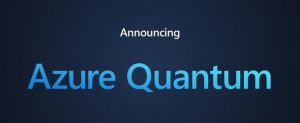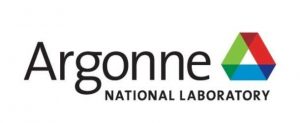Quantum News Briefs March 9: QuantWare closes €6 million Seed Round led by Forward.One, with QDNL Participations and Graduate Entrepreneur; Microsoft makes it easier to integrate classical & quantum computing; Argonne scientists discover method for introducing spinning electrons as qubits in host + MORE

Quantum News Briefs March 9:
QuantWare closes €6 million Seed Round led by Forward.One, with QDNL Participations and Graduate Entrepreneur
 QuantWare, the leading provider of large-scale superconducting quantum processors, announced on March 9 a €6 million Seed Round led by Forward.One, with QDNL Participations and Graduate Entrepreneur also playing a significant role in the round. Quantum News Briefs summarizes the announcement.
QuantWare, the leading provider of large-scale superconducting quantum processors, announced on March 9 a €6 million Seed Round led by Forward.One, with QDNL Participations and Graduate Entrepreneur also playing a significant role in the round. Quantum News Briefs summarizes the announcement.
QuantWare will use the funding to scale its team to support the production and development of its new 64 qubit processor ‘Tenor’. The device provides more than twice the number of qubits compared to its previous largest QPU at a 10x lower price point than competing solutions and opens the door to quantum processors with thousands of qubits.
QuantWare’s aim is to become the ‘Intel of quantum computing’ by providing easy-to-use, increasingly powerful and affordable quantum processors to organisations across the world. Last year, QuantWare was selected to deliver quantum processing units for Israel’s first fully functional quantum computer.
QuantWare has developed a patented 3D technology that routes the connections vertically, making it possible to scale superconducting quantum processors to thousands of qubits – opening the door to ‘quantum advantage’ where quantum computers will overtake the most powerful classical computer. Tenor marks a significant advance in commercial quantum computing because it is the first device commercially available that features this technology.
Matthijs Rijlaarsdam, CEO of QuantWare, said: “We believe that one of the key ways to supercharge development of the quantum computing sector is to provide the technology to enable companies to significantly scale their solutions at much lower costs. This is what Tenor enables, and with this funding we will be able to ramp up production and continue development of even more powerful processors.”
Paul Pruijmboom, Partner at FORWARD.one Venture Capital for Hardware, said: “We are proud to have been one of the first investors to see QuantWare’s potential in 2021. . . “. ” Click here to read announcement in-entirety on the Quantware site.
Microsoft makes it easier to integrate classical & quantum computing
 Microsoft estimates that a quantum computer that will be able to help solve some of the world’s most pressing questions will require at least a million stable qubits. It’ll take massive classical compute power — which is really only available in the cloud — to control a machine like this and handle the error correction algorithms needed to keep it stable. Quantum News Briefs summarizes March 8 TechCrunch+ article below.
Microsoft estimates that a quantum computer that will be able to help solve some of the world’s most pressing questions will require at least a million stable qubits. It’ll take massive classical compute power — which is really only available in the cloud — to control a machine like this and handle the error correction algorithms needed to keep it stable. Quantum News Briefs summarizes March 8 TechCrunch+ article below.
Indeed, Microsoft estimates that to achieve the necessary fault tolerance, a quantum computer will need to be integrated with a peta-scale compute platform that can manage between 10 to 100 terabits per second of data moving between the quantum and classical machine. At the American Physical Society March Meeting in Las Vegas, Microsoft showed off some of the work it has been doing on enabling this and launching what it calls the “Integrated Hybrid” feature in Azure Quantum.
“With this Integrated Hybrid feature, you can start to use — within your quantum applications — classical code right alongside quantum code,” Krysta Svore, Microsoft’s VP of Advanced Quantum Development, told me. “It’s mixing that classical and quantum code together that unlocks new types, new styles of quantum algorithms, prototypes, sub routines, if you will, where you can control what you do to qubits based on classical information. This is a first in the industry.”
“Arguably, the only place you will be able to have scaled-up quantum machines, scaled-up quantum computing will be in a public cloud because it’s that critical to have that level of scale of classical computing integrated with the quantum machine,” Svore explained. Click here to read Frederic Lardinois‘s article in-entirety on TechCrunch+.
Argonne scientists discover method for introducing spinning electrons as qubits in host
 Nanomaterial Scientists at the U.S. Department of Energy’s (DOE) Argonne National Laboratory have discovered a method for introducing spinning electrons as qubits in a host nanomaterial. Their test results revealed record long coherence times — the key property for any practical qubit because it defines the number of quantum operations that can be performed in the lifetime of the qubit.
Nanomaterial Scientists at the U.S. Department of Energy’s (DOE) Argonne National Laboratory have discovered a method for introducing spinning electrons as qubits in a host nanomaterial. Their test results revealed record long coherence times — the key property for any practical qubit because it defines the number of quantum operations that can be performed in the lifetime of the qubit.
The team chose to investigate a nanomaterial that is made from carbon atoms only, has a hollow tubular shape and has thickness of only about one nanometer, or a billionth of a meter, roughly 100,000 times thinner than the width of a human hair.“These carbon nanotubes are typically a few micrometers long,” said Xuedan Ma. “They are mostly free of fluctuating nuclear spins that would interfere with the spin of the electron and reduce its coherence time.”
Ma is a scientist in Argonne’s Center for Nanoscale Materials (CNM), a DOE Office of Science user facility. She also holds appointments at the Pritzker School of Molecular Engineering at the University of Chicago and Northwestern-Argonne Institute of Science and Engineering at Northwestern University.
The team’s test results revealed record long coherence times compared to those of systems made by other means — 10 microseconds. Given their small size, the team’s spin qubit platform can be more easily integrated into quantum devices and permits many possible ways to read out the quantum information. Also, the carbon tubes are very flexible and their vibrations can be used to store information from the qubit.
“It is a long way from our spin qubit in a carbon nanotube to practical technologies, but this is a large early step in that direction,” Ma said.
New quantum enhanced cryptographic chip released by ID Quantique, KCS and SK Telecom
 SK Telecom and ID Quantique presented a new quantum-enhanced cryptographic chip co-developed with Korea Computer & Systems (KCS), a maker of IoT security cryptographic chips to secure IoT devices communication at last week’s Mobile World Congress in Barcelona.
SK Telecom and ID Quantique presented a new quantum-enhanced cryptographic chip co-developed with Korea Computer & Systems (KCS), a maker of IoT security cryptographic chips to secure IoT devices communication at last week’s Mobile World Congress in Barcelona.
This quantum-enhanced cryptographic chip is an ultra-compact and low-power chip that provides strong security functions to various IoT-based products and devices. Adding ID Quantique’s ultra-compact QRNG chip (IDQ250C3) to KCS’ crypto chip ensures trusted authentication and encryption of sensitive information and make our connected world more secure. The combination of these two chips into one chipset is more cost effective and a compact solution, allowing board size to be reduced by 20% thanks to a higher integration level, compared to the case of mounting two existing and separate chips on a board. In addition, the new chip is in the process of acquiring the highest level of security from the Korean National Intelligence Service’s KCMVP certification body. It targets the fast-growing security market with applications from national defense sectors to industrial and public sectors.
KCS, SK Telecom and IDQ have been collaborating for several years, bringing to the market a whole range of crypto chip-based solutions aiming at ensuring and enhancing IT security without compromising on performance and speed. Click here to read the February 28 Newswire announcement in-entirety.
Sandra K. Helsel, Ph.D. has been researching and reporting on frontier technologies since 1990. She has her Ph.D. from the University of Arizona.





















